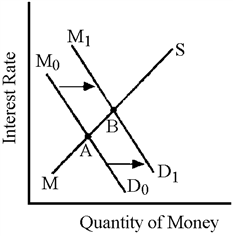Exam 32: Budget Deficits in the Short and Long Run
Exam 1: What Is Economics261 Questions
Exam 2: The Economy: Myth and Reality185 Questions
Exam 3: The Fundamental Economic Problem: Scarcity and Choice290 Questions
Exam 4: Supply and Demand: an Initial Look337 Questions
Exam 21: An Introduction to Macroeconomics216 Questions
Exam 22: The Goals of Macroeconomic Policy212 Questions
Exam 23: Economic Growth: Theory and Policy228 Questions
Exam 24: Aggregate Demand and the Powerful Consumer219 Questions
Exam 25: Demand-Side Equilibrium: Unemployment or Inflation216 Questions
Exam 26: Bringing in the Supply Side: Unemployment and Inflation228 Questions
Exam 27: Managing Aggregate Demand: Fiscal Policy210 Questions
Exam 28: Money and the Banking System224 Questions
Exam 29: Monetary Policy: Conventional and Unconventional210 Questions
Exam 30: The Financial Crisis and the Great Recession66 Questions
Exam 31: The Debate Over Monetary and Fiscal Policy219 Questions
Exam 32: Budget Deficits in the Short and Long Run215 Questions
Exam 33: The Trade-Off Between Inflation and Unemployment219 Questions
Exam 34: International Trade and Comparative Advantage226 Questions
Exam 35: The International Monetary System: Order or Disorder218 Questions
Exam 36: Exchange Rates and the Macroeconomy219 Questions
Exam 37: Contemporary Issues in the Us Economy23 Questions
Select questions type
What is "crowding out"? Why is it important in discussions of fiscal policy? Use an appropriate diagram to illustrate your answer.
(Essay)
4.9/5  (31)
(31)
Which of the following statements about the national debt has the most validity?
(Multiple Choice)
4.9/5  (34)
(34)
Falling GDP leads to higher transfer payments and lower tax receipts.
(True/False)
4.9/5  (36)
(36)
A budget deficit will be most inflationary if the aggregate
(Multiple Choice)
4.7/5  (31)
(31)
In contrast to Argentina in 2001, the United States debt is less of a burden because the U.S. debt is
(Multiple Choice)
4.9/5  (38)
(38)
The United States need never pay off the national debt; it can simply refinance the debt when it comes due. The flaw in thinking that the government must pay it off is based on the fallacy of
(Multiple Choice)
4.8/5  (43)
(43)
When will the difference between the actual deficit and the structural deficit be the largest?
(Multiple Choice)
4.9/5  (43)
(43)
In the short run, the dominant effect of deficit reduction causes an
(Multiple Choice)
4.8/5  (45)
(45)
The central bank is said to monetize the deficit when it purchases bonds issued by the government.
(True/False)
4.9/5  (43)
(43)
Figure 32-3
 If budget deficits shift the money demand curve as is illustrated in Figure 32-3, which component of total expenditures will be affected the most?
If budget deficits shift the money demand curve as is illustrated in Figure 32-3, which component of total expenditures will be affected the most?
(Multiple Choice)
4.8/5  (41)
(41)
The fallacy in the strict crowding-out argument comes from supposing that
(Multiple Choice)
4.8/5  (36)
(36)
If the economy is in a recessionary gap and the government attempts to balance the budget, the effect will be to
(Multiple Choice)
4.8/5  (37)
(37)
If the government ran a major deficit, and there was no noticeable effect on the level of GDP, this could be taken as evidence of
(Multiple Choice)
4.9/5  (34)
(34)
Which of the following is true regarding the effect of deficits from 1980 to 2005 in the United States?
(Multiple Choice)
4.8/5  (34)
(34)
The strict crowding-out argument relies on the assumption that
(Multiple Choice)
4.9/5  (30)
(30)
Showing 81 - 100 of 215
Filters
- Essay(0)
- Multiple Choice(0)
- Short Answer(0)
- True False(0)
- Matching(0)